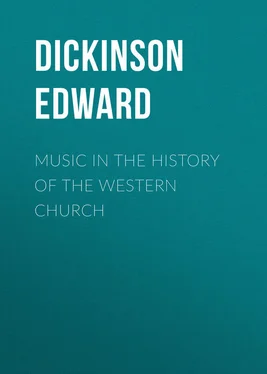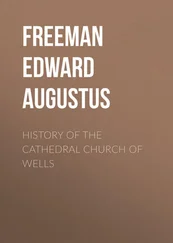Edward Dickinson - Music in the History of the Western Church
Здесь есть возможность читать онлайн «Edward Dickinson - Music in the History of the Western Church» — ознакомительный отрывок электронной книги совершенно бесплатно, а после прочтения отрывка купить полную версию. В некоторых случаях можно слушать аудио, скачать через торрент в формате fb2 и присутствует краткое содержание. Жанр: foreign_antique, foreign_prose, на английском языке. Описание произведения, (предисловие) а так же отзывы посетителей доступны на портале библиотеки ЛибКат.
- Название:Music in the History of the Western Church
- Автор:
- Жанр:
- Год:неизвестен
- ISBN:нет данных
- Рейтинг книги:4 / 5. Голосов: 1
-
Избранное:Добавить в избранное
- Отзывы:
-
Ваша оценка:
- 80
- 1
- 2
- 3
- 4
- 5
Music in the History of the Western Church: краткое содержание, описание и аннотация
Предлагаем к чтению аннотацию, описание, краткое содержание или предисловие (зависит от того, что написал сам автор книги «Music in the History of the Western Church»). Если вы не нашли необходимую информацию о книге — напишите в комментариях, мы постараемся отыскать её.
Music in the History of the Western Church — читать онлайн ознакомительный отрывок
Ниже представлен текст книги, разбитый по страницам. Система сохранения места последней прочитанной страницы, позволяет с удобством читать онлайн бесплатно книгу «Music in the History of the Western Church», без необходимости каждый раз заново искать на чём Вы остановились. Поставьте закладку, и сможете в любой момент перейти на страницу, на которой закончили чтение.
Интервал:
Закладка:
Dr. Schaff defines the gift of tongues as “an utterance proceeding from a state of unconscious ecstasy in the speaker, and unintelligible to the hearer unless interpreted. The speaking with tongues is an involuntary, psalm-like prayer or song uttered from a spiritual trance, in a peculiar language inspired by the Holy Spirit. The soul is almost entirely passive, an instrument on which the Spirit plays his heavenly melodies.” “It is emotional rather than intellectual, the language of excited imagination, not of cool reflection.” 32 32 Schaff, History of the Christian Church , I. p. 234 f.; p. 435.
St. Paul was himself an adept in this singular form of worship, as he himself declares in 1 Cor. xiv. 18; but with his habitual coolness of judgment he warns the excitable Corinthian Christians that sober instruction is more profitable, that the proper end of all utterance in common public worship is edification, and enjoins as an effective restraint that “if any man speaketh in a tongue, let one interpret; but if there be no interpreter, let him keep silence in the Church; and let him speak to himself and to God.” 33 33 1 Cor. xiv. 27, 28.
With the regulation of the worship in stated liturgic form this extemporaneous ebullition of feeling was done away, but if it was analogous, as it probably was, to the practice so common in Oriental vocal music, both ancient and modern, of delivering long wordless tonal flourishes as an expression of joy, then it has in a certain sense survived in the “jubilations” of the Catholic liturgical chant, which in the early Middle Age were more extended than now. Chappell finds traces of a practice somewhat similar to the “jubilations” existing in ancient Egypt. “This practice of carolling or singing without words, like birds, to the gods, was copied by the Greeks, who seem to have carolled on four vowels. The vowels had probably, in both cases, some recognized meaning attached to them, as substitutes for certain words of praise – as was the case when the custom was transferred to the Western Church.” 34 34 Chappell, History of Music .
This may or may not throw light upon the obscure nature of the glossolalia, but it is not to be supposed that the Corinthian Christians invented this custom, since we find traces of it in the worship of the ancient pagan nations; and so far as it was the unrestrained outburst of emotion, it must have been to some extent musical, and only needed regulation and the application of a definite key-system to become, like the mediaeval Sequence under somewhat similar conditions, an established order of sacred song.
Out of a musical impulse, of which the glossolalia was one of many tokens, united with the spirit of prophecy or instruction, grew the hymns of the infant Church, dim outlines of which begin to appear in the twilight of this obscure period. The worshipers of Christ could not remain content with the Hebrew psalms, for, in spite of their inspiriting and edifying character, they were not concerned with the facts on which the new faith was based, except as they might be interpreted as prefiguring the later dispensation. Hymns were required in which Christ was directly celebrated, and the apprehension of his infinite gifts embodied in language which would both fortify the believers and act as a converting agency. It would be contrary to all analogy and to the universal facts of human nature if such were not the case, and we may suppose that a Christian folk-song, such as the post-apostolic age reveals to us, began to appear in the first century. Some scholars believe that certain of these primitive hymns, or fragments of them, are embalmed in the Epistles of St. Paul and the Book of the Revelation. 35 35 Among such supposed quotations are: Eph. v. 14; 1 Tim. iii. 16; 2 Tim. ii. 11; Rev. iv. 11; v. 9-13; xi. 15-18; xv. 3, 4.
The magnificent description of the worship of God and the Lamb in the Apocalypse has been supposed by some to have been suggested by the manner of worship, already become liturgical, in the Eastern churches. Certainly there is a manifest resemblance between the picture of one sitting upon the throne with the twenty-four elders and a multitude of angels surrounding him, as set forth in the Apocalypse, and the account given in the second book of the Constitutions of the Apostles of the throne of the bishop in the middle of the church edifice, with the presbyters and deacons on each side and the laity beyond. In this second book of the Constitutions, belonging, of course, to a later date than the apostolic period, there is no mention of hymn singing. The share of the people is confined to responses at the end of the verses of the psalms, which are sung by some one appointed to this office. 36 36 Constitutions of the Apostles , book. ii. chap. 57.
The sacerdotal and liturgical movement had already excluded from the chief acts of worship the independent song of the people. Those who assume that the office of song in the early Church was freely committed to the general body of believers have some ground for their assumption; but if we are able to distinguish between the private and public worship, and could know how early it was that set forms and liturgies were adopted, it would appear that at the longest the time was very brief when the laity were allowed a share in any but the subordinate offices. The earliest testimony that can be called definite is contained in the celebrated letter of the younger Pliny from Bithynia to the Emperor Trajan, in the year 112, in which the Christians are described as coming together before daylight and singing hymns alternately (invicem) to Christ. This may with some reason be held to refer to responsive or antiphonal singing, similar to that described by Philo in his account of the worship of the Jewish sect of the Therapeutae in the first century. The tradition was long preserved in the Church that Ignatius, bishop of Antioch in the second century, introduced antiphonal chanting into the churches of that city, having been moved thereto by a vision of angels singing in that manner. But we have only to go back to the worship of the ancient Hebrews for the suggestion of this practice. This alternate singing appears to have been most prevalent in the Syrian churches, and was carried thence to Milan and Rome, and through the usage in these cities was established in the permanent habit of the Western Church.
Although the singing of psalms and hymns by the body of worshipers was, therefore, undoubtedly the custom of the churches while still in their primitive condition as informal assemblies of believers for mutual counsel and edification, the steady progress of ritualism and the growth of sacerdotal ideas inevitably deprived the people of all initiative in the worship, and concentrated the offices of public devotion, including that of song, exclusively in the hands of the clergy. By the middle of the fourth century, if not earlier, the change was complete. The simple organization of the apostolic age had developed by logical gradations into a compact hierarchy of patriarchs, bishops, priests, and deacons. The clergy were no longer the servants or representatives of the people, but held a mediatorial position as the channels through which divine grace was transmitted to the faithful. The great Eastern liturgies, such as those which bear the names of St. James and St. Mark, if not yet fully formulated and committed to writing, were in all essentials complete and adopted as the substance of the public worship. The principal service was divided into two parts, from the second of which, the eucharistic service proper, the catechumens and penitents were excluded. The prayers, readings, and chanted sentences, of which the liturgy mainly consisted, were delivered by priests, deacons, and an officially constituted choir of singers, the congregation uniting only in a few responses and ejaculations. In the liturgy of St. Mark, which was the Alexandrian, used in Egypt and neighboring countries, we find allotted to the people a number of responses: “Amen,” “Kyrie eleison,” “And to thy spirit” (in response to the priest’s “Peace be to all”); “We lift them up to the Lord” (in response to the priest’s “Let us lift up our hearts”); and “In the name of the Lord; Holy God, holy mighty, holy immortal,” after the Trisagion; “And from the Holy Spirit was he made flesh,” after the prayer of oblation; “Holy, holy, holy Lord,” before the consecration; “Our Father, who art in heaven,” etc.; before the communion, “One Father holy, one Son holy, one Spirit holy, in the unity of the Holy Spirit, Amen;” at the dismissal, “Amen, blessed be the name of the Lord.”
Читать дальшеИнтервал:
Закладка:
Похожие книги на «Music in the History of the Western Church»
Представляем Вашему вниманию похожие книги на «Music in the History of the Western Church» списком для выбора. Мы отобрали схожую по названию и смыслу литературу в надежде предоставить читателям больше вариантов отыскать новые, интересные, ещё непрочитанные произведения.
Обсуждение, отзывы о книге «Music in the History of the Western Church» и просто собственные мнения читателей. Оставьте ваши комментарии, напишите, что Вы думаете о произведении, его смысле или главных героях. Укажите что конкретно понравилось, а что нет, и почему Вы так считаете.












